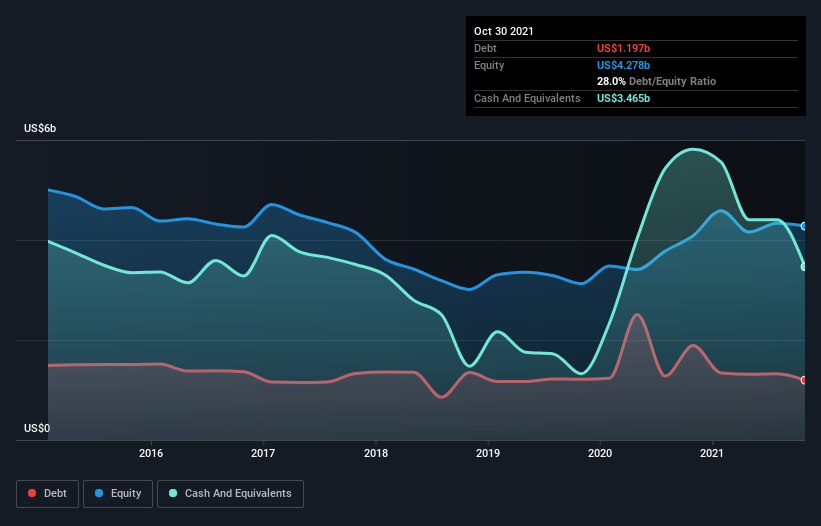Does Best Buy (NYSE:BBY) Have A Healthy Balance Sheet?
Legendary fund manager Li Lu (who Charlie Munger backed) once said, 'The biggest investment risk is not the volatility of prices, but whether you will suffer a permanent loss of capital.' When we think about how risky a company is, we always like to look at its use of debt, since debt overload can lead to ruin. We can see that Best Buy Co., Inc. (NYSE:BBY) does use debt in its business. But is this debt a concern to shareholders?
What Risk Does Debt Bring?
Debt assists a business until the business has trouble paying it off, either with new capital or with free cash flow. If things get really bad, the lenders can take control of the business. However, a more common (but still painful) scenario is that it has to raise new equity capital at a low price, thus permanently diluting shareholders. By replacing dilution, though, debt can be an extremely good tool for businesses that need capital to invest in growth at high rates of return. When we think about a company's use of debt, we first look at cash and debt together.
View our latest analysis for Best Buy
What Is Best Buy's Debt?
As you can see below, Best Buy had US$1.20b of debt at October 2021, down from US$1.89b a year prior. However, it does have US$3.47b in cash offsetting this, leading to net cash of US$2.27b.
How Strong Is Best Buy's Balance Sheet?
The latest balance sheet data shows that Best Buy had liabilities of US$11.9b due within a year, and liabilities of US$3.88b falling due after that. On the other hand, it had cash of US$3.47b and US$1.02b worth of receivables due within a year. So its liabilities total US$11.3b more than the combination of its cash and short-term receivables.
This deficit isn't so bad because Best Buy is worth a massive US$23.2b, and thus could probably raise enough capital to shore up its balance sheet, if the need arose. But we definitely want to keep our eyes open to indications that its debt is bringing too much risk. While it does have liabilities worth noting, Best Buy also has more cash than debt, so we're pretty confident it can manage its debt safely.
On top of that, Best Buy grew its EBIT by 41% over the last twelve months, and that growth will make it easier to handle its debt. The balance sheet is clearly the area to focus on when you are analysing debt. But ultimately the future profitability of the business will decide if Best Buy can strengthen its balance sheet over time. So if you want to see what the professionals think, you might find this free report on analyst profit forecasts to be interesting.
Finally, a company can only pay off debt with cold hard cash, not accounting profits. Best Buy may have net cash on the balance sheet, but it is still interesting to look at how well the business converts its earnings before interest and tax (EBIT) to free cash flow, because that will influence both its need for, and its capacity to manage debt. During the last three years, Best Buy generated free cash flow amounting to a very robust 98% of its EBIT, more than we'd expect. That positions it well to pay down debt if desirable to do so.
Summing up
Although Best Buy's balance sheet isn't particularly strong, due to the total liabilities, it is clearly positive to see that it has net cash of US$2.27b. The cherry on top was that in converted 98% of that EBIT to free cash flow, bringing in US$1.4b. So is Best Buy's debt a risk? It doesn't seem so to us. When analysing debt levels, the balance sheet is the obvious place to start. But ultimately, every company can contain risks that exist outside of the balance sheet. Be aware that Best Buy is showing 3 warning signs in our investment analysis , and 2 of those can't be ignored...
Of course, if you're the type of investor who prefers buying stocks without the burden of debt, then don't hesitate to discover our exclusive list of net cash growth stocks, today.
Have feedback on this article? Concerned about the content? Get in touch with us directly. Alternatively, email editorial-team (at) simplywallst.com.
This article by Simply Wall St is general in nature. We provide commentary based on historical data and analyst forecasts only using an unbiased methodology and our articles are not intended to be financial advice. It does not constitute a recommendation to buy or sell any stock, and does not take account of your objectives, or your financial situation. We aim to bring you long-term focused analysis driven by fundamental data. Note that our analysis may not factor in the latest price-sensitive company announcements or qualitative material. Simply Wall St has no position in any stocks mentioned.

